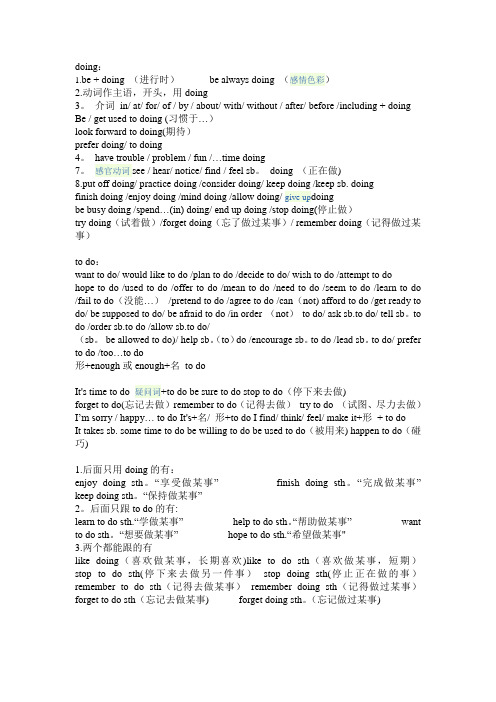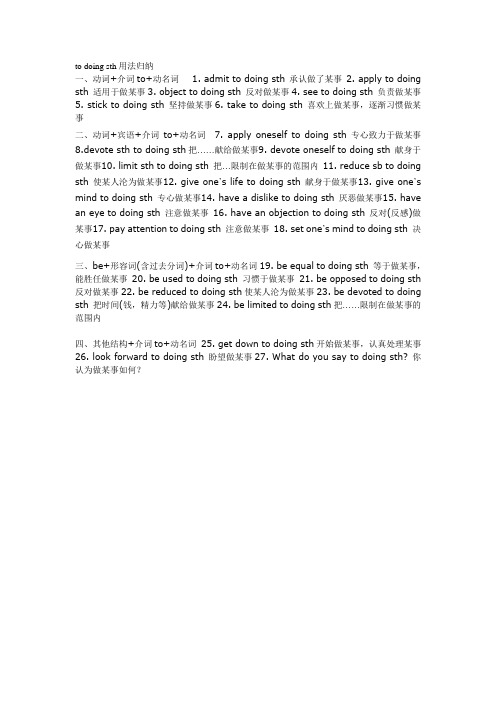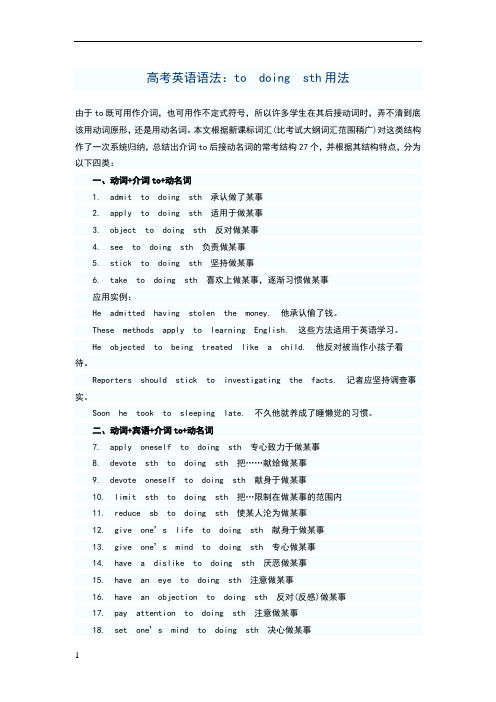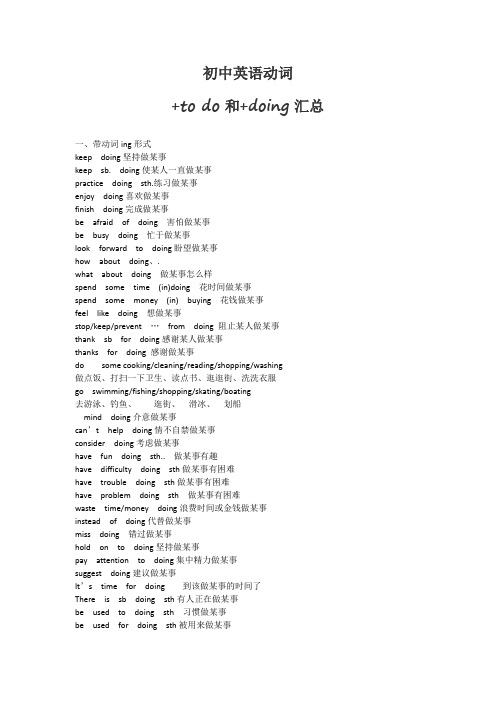Todoing用法归纳
动词to-do-和-doing总结和口诀

动词后加to do 和 doing的记忆口诀一、只能用动名词(ing)作宾语[口诀]考虑建议盼原谅,承认推迟没得想。
避免错过继续练,否定完成停欣赏。
禁止想象才冒险,不禁介意弃逃亡。
consider考虑suggest建议/advocate 提倡主张look forward to 盼望forgive原谅/pardon 原谅acknowledge承认/admit 承认postpone延迟延期/delay 延迟/defer 拖延recall回想/fancy 幻想爱好avoid避免miss错过keep保持practise练习实践deny否认complete完成/finish 完成cease停止/quit 放弃停止appreciate感激欣赏forbid禁止/prevent 阻止imagine设想risk冒险can’t help 不禁mind介意escape逃跑逃避加动名词的动词大集合口诀(原创)故事是以一个家长的口吻讲述:我有时很感激欣赏(appreciate)我的孩子,但总是避免(avoid)承认(admit)这一点,请允许(allow)我寻求您的建议(advise),{名词为advice}您考虑(consider)后告诉我如何克服这个小缺点。
还有一件事,我的孩子总是拖延(delay)他不喜欢(dislike)的事,不可否认(deny)这就是逃避(escape)。
老师原谅(excuse)了他,但是告诫他要喜欢(enjoy)自己的该做的事。
我曾经禁止(forbid)他凭空想象(fancy)赶快完成(finish)自己手头的事,他反对我并保持(keep)他的想象(imagine),说介意(mind)自已会错过(miss)任何灵感。
有专家告诉我要允许(allow)孩子去实践(practise),去冒险(risk),因为孩子不能抵制(resist)自己闯的诱惑,只要建议(suggest)他忍受(stand)住任何学习工作的艰苦就可以了。
英语to do与doing固定搭配

doing:1.be + doing (进行时)be always doing (感情色彩)2.动词作主语,开头,用doing3。
介词in/ at/ for/ of / by / about/ with/ without / after/ before /including + doing Be / get used to doing (习惯于…)look forward to doing(期待)prefer doing/ to doing4。
have trouble / problem / fun /…time doing7。
感官动词see / hear/ notice/ find / feel sb。
doing (正在做)8.put off doing/ practice doing /consider doing/ keep doing /keep sb. doingfinish doing /enjoy doing /mind doing /allow doing/ give up doingbe bu sy doing /spend…(in) doing/ end up doing /stop doing(停止做)try doing(试着做)/forget doing(忘了做过某事)/ remember doing(记得做过某事)to do:want to do/ would like to do /plan to do /decide to do/ wish to do /attempt to dohope to do /used to do /offer to do /mean to do /need to do /seem to do /learn to do /fail to do(没能…)/pretend to do /agree to do /can(not) afford to do /get ready to do/ be supposed to do/ be afraid to do /in order (not)to do/ ask sb.to do/ tell sb。
Do、To do、Doing 的用法

Do/To do/Doing 的用法1.+ to do=+ doing:开始做某事begin to do/doing =start to do / doing 不喜欢dislike to do / doing 憎恨做某事hate to do/ doing喜欢做某事like / love to do / doing2.+ to do≠+ doing:忘记去做某事forget to do忘记已经做过某事forget doing记住去做某事(未做)remember to do记得已经做过某事remember doing 继续另一件事go on to do继续做原来的事go on doing 停下来去做某事stop to do 停止做某事stop doing 努力做某事try to do试着做某事try doing悔恨没做某事regret to do 后悔已做某事regret doing3.+ do帮助做某事help (to) do宁愿(不)做某事would rather (not) do最好(不)做某事had better (not) do4.+ doing:完成做某事finish doing喜欢做某事enjoy doing一直做某事keep doing练习做某事practise doing考虑做某事consider doing坚持做某事insist on / upon doing避免做某事avoid doing建议做某事suggest doing错过做某事miss doing想象做某事imagine doing介意做某事mind doing忍不住做某事can’t help doing坚持做某事keep on/ carry on doing成功做某事succeed/ be successful in doing 忙于做某事be busy (in) doing…怎么样? What /How about doing?对做某事感兴趣be interested in doing 因某事谢谢某人thank you for doing(非常)值得被…be (well) worth doing因为…because of doing而不是instead of doing(没)有做某事without/ with doing通过做某事by doing sth担心做某事worry about doing害怕做某事be afraid of doing放弃做某事give up doing做某事有麻烦have trouble / problems /difficulty (in) doing做某事开心have fun/ a good time/enjoy oneself (in) doing浪费时间做某事lose/waste time (in) doing sth 将某人的精力投入到…put one’s effort into doing 某人花费时/钱做某事sb spend +时间/钱(in) doing梦想做某事dream of/about doing5.+to do :选择做某事choose to do拒绝做某事refuse to do需要做某事need to do=require to do迫不及待做某事can’t wait to do准备做某事prepare to do=be ready to do 计划做某事plan to do决定做某事decide to do = make a decision to do = make up one’s mind(s) to do学习learn to do继续做某事continue to do付得起做某事afford to do 似乎做某事seem to do过去常常做某事used to do敢做某事dare to do梦见做某事dream to do碰巧做某事happen to do想做某事would like to do = want to do 别无选择做某事have no choice but to do 同意做某事agree to do希望做某事hope to do希望做某事wish to do不得不做某事have to do做某事失败fail to do答应做某事promise to do逐步做某事get to do更喜欢做某事prefer to do设法做某事manage to do应该做某事ought to do主动做某事offer to do尽某人最大努力做某事try/ do one’s best to do 采取措施做某事take action(s)/steps to do 等着轮到某人做某事wait for one’s turn to do轮流做某事take one’s turn to do有机会做某事have a chance to do没有时间做某事have no time to do与…比起来宁愿做某事prefer to do rather than do =would rather do than do足够…做某事enough+n.+ to do ,adj./adv.+enough+ to do为了… to do = in order to do= so as to do=for doing6.to doing :盼望做某事look forward to doing 习惯于做某事be used to doing 致力于做某事devote …to doing 与…比起来宁愿做某事prefer doing to doing 对…做出贡献make contribution(s) to doing 导致lead to donig7. sb to do :命令某人做某事order sb to do答应某人做某事promise sb to do邀请某人做某事invite sb to do警告某人(不)做某事warn sb (not) to do请求某人(不)做某事ask sb (not ) to do吩咐某人(不)做某事tell sb (not) to do想要某人(不)做某事would like sb(not) to do 需要某人做某事need /require sb (not) to do 鼓励某人做某事encourage sb to do使用某人做某事use sth to do教某人做某事teach sb to do 导致某人做某事cause sb to do训练某人做某事train sb to do建议某人做某事advise sb to do允许某人做某事allow sb to do希望某人做某事wish sb to do让某人做木事get sb to do提醒某人做某事remind sb to do拒绝某人做某事refuse sb to do迫使某人做某事force sb to do (agree sb to do是错的,hope sb to do 是错的)8.sb doing:使某人一直做某事keep sb doing sth 介意某人做某事mind sb/ sb’s doing 阻止某人做某事prevent /stop sb (from )doing = keep sb from doing 发现某人正在做某事find sb doing9.sb do/doing看见某人做某事see sb do/ doing 观看某人做某事watch sb do/ doing 听见某人做某事hear sb do/ doing 注意某人做某事notice sb do/ doing(句中有表示时点的词用doing, 有表示频度和感情的词用do)10.sb do:使某人做某事make sb do 让某人做某事let/have sb do帮助某人做某事help sb do = help sb to do11.关于to do/doing/do的句型(1)做某事花费某人…It takes /took+sb+ 时间+ to do (2)做某事对某人而言是…的It’s + adj. for sb/ of sb to do (3)做某事对某人而言是一个遗憾It’s a pity for sb to do(4)是某人第一次做某事It’s one’s first time to do(5)到了(某人)做某事的时候了。
to doing sth用法

to doing sth用法归纳一、动词+介词to+动名词 1. admit to doing sth 承认做了某事2. apply to doing sth 适用于做某事3. object to doing sth 反对做某事4. see to doing sth 负责做某事5. stick to doing sth 坚持做某事6. take to doing sth 喜欢上做某事,逐渐习惯做某事二、动词+宾语+介词to+动名词7. apply oneself to doing sth专心致力于做某事8.devote sth to doing sth把……献给做某事9. devote oneself to doing sth 献身于做某事10. limit sth to doing sth 把…限制在做某事的范围内11. reduce sb to doing sth 使某人沦为做某事12. give one’s life to doing sth 献身于做某事13. give one’s mind to doing sth 专心做某事14. have a dislike to doing sth 厌恶做某事15. have an eye to doing sth 注意做某事16. have an objection to doing sth 反对(反感)做某事17. pay attention to doing sth 注意做某事18. set one’s mind to doing sth 决心做某事三、be+形容词(含过去分词)+介词to+动名词19. be equal to doing sth 等于做某事,能胜任做某事20. be used to doing sth 习惯于做某事21. be opposed to doing sth 反对做某事22. be reduced to doing sth使某人沦为做某事23. be devoted to doing sth 把时间(钱,精力等)献给做某事24. be limited to doing sth把……限制在做某事的范围内四、其他结构+介词to+动名词25. get down to doing sth开始做某事,认真处理某事26. look forward to doing sth 盼望做某事27. What do you say to doing sth? 你认为做某事如何?。
to-do与doing归纳

接动词不定式 ( to do sth )1.like to do sth2.want to do sth3.want sb to do sth4.love to do sth5.ask sb (not ) to do sth6.tell sb (not ) to do sth7.It’s time (for sb) to do sth8. It’s +adj +(for)of +sb + to do sth9. find it +adj + to do sth10. It takes sb +some time + to do sth11.have to do sth12.try (not ) to do sth13.try one’s best to do sth14. help sb (to ) do sth15.plan to do sth16. a good place to do sth17. decide (not ) to do sth18.invite sb to do sth19.live to be +时间20.be able to do sth21.seem to do sth22.疑问词+ to do sth23.need sth to do sthe sth to do sth25. warn sb to do sth26.need to do sth27.a good time to do sth28.the best time to do sth29.the best way to do sth30.be the first / last one to do sth31.would like to do sth32.be excited /surprised to do sth33.be useful to do sth34.be allowed to do sth35.allow sb to do sth36.It’s better to do sth37.It’s best to do sth38.take care (not) to do sth39.have enough time to do sth40.too… to do sth41.not… enough to do sth42.encourage sb to do sth43.choose to do sth44.wait to do sth45.be happy/glad/pleased to do sth46.make it +adj + to do sth47.be careful to do sth48.be afraid to do sth49.It’s our duty to do sthed to do sth51.can’t afford to do sth52.make a decision to do sth53.have an opportunity to do sth54.wait for sb to do sth55.hurry to do sth56.refuse to do sth57.agree to do sth58.pretend to do sth59.prefer to do sth60.prefer to do sth raher than do sth61.be willing to do sth62.volunteer to do sth63.offer to do sth64.rush to do sth65.in order (not ) to do sth66.be sure to do sth67.make plans to do sth68.go out of their way to do sth69.lead sb to do sth70.It’s one’s job to do sth71.It’s one’s turn to do sth72.be supposed to do sth接动名词 (doing sth )1.like doing sth2.enjoy doing sth3.have fun doing sth4.be interested in doing sth5.Thanks for doing sth6.stop sb from doing sth7.What/How doing sth ?8.practice doing sth9.find sb doing sth10.mind (one’s ) doing sth11.can’t stand doing sth12.think about doing sth13.spend … (in)doing sth14.finish doing sth15.be busy doing sth16.keep doing sth17.keep sb from doing sth18.keep sb doing sth19.be good at doing sth20.hate doing sth21.There be +名词+doing sth22.have a difficult time doing sth23.feel like doing sth24.allow doing sth25.end up doing sth26.be afraid of doing sth27.be used to doing sth28.give up doing sth29.instead of doing sth30.have nothing against doing sth31.before/ when /while +doing sth32.have a lot of experience doing sth33.prefer doing sth34.consider doing sth35.dream of / about doing sth40.put off doing sth41.be used for doing sth =be used to do sth42.prefer doing sth to doing sth43.without doing sth44.be comfortable doing sth45.can’t stop/help doing sth46.look forward to doing sth47.be against doing sth48.have trouble/problems/difficulty (in) doing sth49.suggest doing sth50.be worth doing sth51.take up doing sth.接do sth.1. make sb do sth2. can, may , must, will, would, should, could, 接do sth.3. why not do sth.4. would rather do sth than do sth即可接to do 又可接doing1. remember to do sth 记得去做某事Remember doing sth 记得做过某事2. forget to do sth 忘记去做某事forget doing sth 忘记做过某事3. start / begin to do sthStart/ begin doing sth 这两种用法基本一样4. stop to do sth 停下(一件事)去做某事Stop doing sth 停止做某事。
高考英语语法:to doing sth用法

高考英语语法:to doing sth用法由于to既可用作介词,也可用作不定式符号,所以许多学生在其后接动词时,弄不清到底该用动词原形,还是用动名词。
本文根据新课标词汇(比考试大纲词汇范围稍广)对这类结构作了一次系统归纳,总结出介词to后接动名词的常考结构27个,并根据其结构特点,分为以下四类:一、动词+介词to+动名词1. admit to doing sth 承认做了某事2. apply to doing sth 适用于做某事3. object to doing sth 反对做某事4. see to doing sth 负责做某事5. stick to doing sth 坚持做某事6. take to doing sth 喜欢上做某事,逐渐习惯做某事应用实例:He admitted having stolen the money. 他承认偷了钱。
These methods apply to learning English. 这些方法适用于英语学习。
He objected to being treated like a child. 他反对被当作小孩子看待。
Reporters should stick to investigating the facts. 记者应坚持调查事实。
Soon he took to sleeping late. 不久他就养成了睡懒觉的习惯。
二、动词+宾语+介词to+动名词7. apply oneself to doing sth 专心致力于做某事8. devote sth to doing sth 把……献给做某事9. devote oneself to doing sth 献身于做某事10. limit sth to doing sth 把…限制在做某事的范围内11. reduce sb to doing sth 使某人沦为做某事12. give one’s life to doing sth 献身于做某事13. give one’s mind to doing sth 专心做某事14. have a dislike to doing sth 厌恶做某事15. have an eye to doing sth 注意做某事16. have an objection to doing sth 反对(反感)做某事17. pay attention to doing sth 注意做某事18. set one’s mind to doing sth 决心做某事应用实例:She applied herself to learning English. 她专心学习英语。
to用法总结

一、动词+介词to+动名词Apply to doing sth.Object to doing sth.See to doing sth.Stick to doing sth.Take to doing sth.He admitted having stolen the money. 他承认偷了钱。
These methods apply to learning English. 这些方法适用于英语学习。
He objected to being treated like a child. 他反对被当作小孩子看待。
Reporters should stick to investigating the facts. 记者应坚持调查事实。
Soon he took to sleeping late. 不久他就养成了睡懒觉的习惯。
二、动词+宾语+介词to+动名词Apply oneself to doing sth. 专心致力于做某事Devote sth to doing sth. 把…献给做某事Devote oneself to doing sth. 献身于做某事Limit sth to doing sth. 把…限制在做某事的范围内Reduce sb. To doing sth. 使某人沦为做某事Give one’s life to doing sth. 献身于做某事Give on e’s mind to doing sth. 专心做某事Have a dislike to doing sth. 厌恶做某事Have an eye to doing sth. 注意做某事Have an objection to doing sth. 反对(反感)做某事Pay attention to doing sth. 注意做某事Set one’s mind to doing sth. 决心做某事She applied herself to learning English. 她专心学习英语。
初中英语动词+to do和doing总结

初中英语动词+to do和+doing汇总一、带动词ing形式keep doing坚持做某事keep sb.doing使某人一直做某事practice doing sth.练习做某事enjoy doing喜欢做某事finish doing完成做某事be afraid of doing害怕做某事be busy doing忙于做某事look forward to doing盼望做某事how about doing、.what about doing 做某事怎么样spend some time(in)doing 花时间做某事spend some money(in)buying花钱做某事feel like doing 想做某事stop/keep/prevent…from doing 阻止某人做某事thank sb for doing感谢某人做某事thanks for doing 感谢做某事do some cooking/cleaning/reading/shopping/washing做点饭、打扫一下卫生、读点书、逛逛街、洗洗衣服go swimming/fishing/shopping/skating/boating去游泳、钓鱼、逛街、滑冰、划船mind doing介意做某事can’t help doing情不自禁做某事consider doing考虑做某事have fun doing sth..做某事有趣have difficulty doing sth做某事有困难have trouble doing sth做某事有困难have problem doing sth做某事有困难waste time/money doing浪费时间或金钱做某事instead of doing代替做某事miss doing错过做某事hold on to doing坚持做某事pay attention to doing集中精力做某事suggest doing建议做某事It’s time for doing到该做某事的时间了There is sb doing sth有人正在做某事be used to doing sth习惯做某事be used for doing sth被用来做某事have a lot of experience具有做某事的丰富经验sb allow doing sth允许做某事put off doing sth推迟做某事succeed in doing sth成功做某事end up doing以做某事结束give up doing放弃做某事二.含有不带to的动词不定式句型(动词原形)1.had better(not)do sth.最好(不)做某事2.would you please(not)do sth你可以做某事吗?3.why not do sth.为什么不做某事?why don’t you do sth.为什么你不做某事?4.Shall we do sth.?我们要做某事吗?5.let sb do sth.让某人做某事6.make sb.do sth.have sb do sth使某人做某事7.feel sb do sth感觉某人做某事三、含有带to的动词不定式句型1.It’s time to do sth.该是做某事的时候了2.It takes sb.some time to do sth做某事花了某人时间3.tell/ask/want/encourage/invite/sb.to do sth.告诉、叫、想、鼓励、邀请某人做某事4.Would you like to do sth.?你想做某事吗?5.It’s good/bad to do sth 做某事好/不好6.It’s good/bad for sb.to do sth.对某人来说,做某事好/不好7.be+adj.+enough to do sth.足够+形容词做某事8.sb.is ready to do sth.某人准备好做某事9.It’s+adj.+for sb.to do sth.做某事对某人+形容词(做这件事对你好)10.It’s+adj.+of sb.to do sth某人做某事+形容词(你做这事真好)11.would like/love/decide/want/wish/to do sth.想、喜欢、决定、想、希望做某事12.would like/love sb.to do sth.想让某人做某事13.prefer to do rather than do sth.宁愿做某事而不愿做某事四、两个动作连用,表目的:ed to do sth过去常常做某事41.be used to do sth被用来做某事42.be supposed to do sth理应做某事,应该做某事43.allow sb to do sth允许某人做某事44.sb be allowed to do sth某人被允许做某事45.the best way is to do sth最好的方法是做某事46.the next step is to do sth下一步是做某事47.have nothing to do with与某事无关48.the first thing is to do sth第一件事是做某事49.it’s best to do sth 最好做某事50.it’s a good time to do sth这是做某事的最好时间it is a good way to do sth做某事是个好的办法51.add to do补充做某事52.urge sb to do催促某人做某事cate sb to do教育某人做某事54.wait for sb to do等待某人做某事55. order sb to do命令某人做某事56.happen to do sth碰巧做某事57.lead sb to do sth领导某人做某事58.it's a good place to do sth这是做某事的好地方59.invite sb to do邀请某人做某事60.get to do sth设计做某事61.expect to do期望做某事62.volunteer to do sth志愿做某事63.offer to do sth主动提供做某事64.have an opportunity to do有机会做某事65.get sb to do sth使某人做某事66.it’s one’s duty to do sth做某事是某人的责任e sth to do sth用某物做某事68.be sure to do sth一定会做某事69.have to do sth不得六、既用不带to的动词不定式又用现在分词的句型:用不带to的动词不定式(原形)强调动作的完成过程;用现在分词强调动作的进行状态。
- 1、下载文档前请自行甄别文档内容的完整性,平台不提供额外的编辑、内容补充、找答案等附加服务。
- 2、"仅部分预览"的文档,不可在线预览部分如存在完整性等问题,可反馈申请退款(可完整预览的文档不适用该条件!)。
- 3、如文档侵犯您的权益,请联系客服反馈,我们会尽快为您处理(人工客服工作时间:9:00-18:30)。
To doing 用法归纳
一、动词+介词to+动名词<?xml:namespace prefix = o ns =
"urn:schemas-microsoft-com:office:office" />
1. admit to doing sth 承认做了某事
2. apply to doing sth 适用于做某事
3. object to doing sth 反对做某事
4. see to doing sth 负责做某事
5. stick to doing sth 坚持做某事
6. take to doing sth 喜欢上做某事,逐渐习惯做某事
应用实例:
He admitted having stolen the money. 他承认偷了钱。
These methods apply to learning English. 这些方法适用于英语学习。
He objected to being treated like a child. 他反对被当作小孩子看待。
Reporters should stick to investigating the facts. 记者应坚持调查事实。
Soon he took to sleeping late. 不久他就养成了睡懒觉的习惯。
二、动词+宾语+介词to+动名词
7. apply oneself to doing sth 专心致力于做某事
8. devote sth to doing sth 把……献给做某事
9. devote oneself to doing sth 献身于做某事
10. limit sth to doing sth 把…限制在做某事的范围内
11. reduce sb to doing sth 使某人沦为做某事
12. give one’s life to doing sth 献身于做某事
13. give one’s mind to doing sth 专心做某事
14. have a dislike to doing sth 厌恶做某事
15. have an eye to doing sth 注意做某事
16. have an objection to doing sth 反对(反感)做某事
17. pay attention to doing sth 注意做某事
18. set one’s mind to doing sth 决心做某事
19.make a contribution to doing sth 为某事作出贡献
应用实例:
She applied herself to learning English. 她专心学习英语。
Hunger reduced them to stealing. 饥饿使他们沦落为盗贼。
She devoted herself to helping the poor. 她致力于帮助穷人。
I have a strong dislike to playing cards for money. 我极讨厌打牌赌博。
He has a strong objection to getting up so early.他很反感这么早就起床。
You should pay more attention to uniting and working with those who differ with you. 你应该更注意团结那些自己意见不同的人一道工作。
三、be+形容词(含过去分词)+介词to+动名词
20. be equal to doing sth 等于做某事,能胜任做某事
21. be used to doing sth 习惯于做某事
22. be opposed to doing sth 反对做某事
23. be reduced to doing sth使某人沦为做某事
24. be devoted to doing sth 把时间(钱,精力等)献给做某事
25. be limited to doing sth把……限制在做某事的范围内
应用实例:
This is equal to saying that he’s a cheat. 这就等于说他是个骗子。
She is used to living in the country. 她习惯于住在乡下。
I’m opposed to telling him the news at once. 我反对马上告诉他这消息。
This dictionary is devoted to explaining word usage. 这本词典是解释词的用法的。
四、其他结构+介词to+动名词
26. get down to doing sth开始做某事,认真处理某事
27. look forward to doing sth 盼望做某事
28. What do you say to doing sth? 你认为做某事如何?
应用实例:
We are looking forward to receiving his letter. 我们盼望收到他的回信。
It’s time we got down to some serious work. 我们该认真干点正事了。
What do you say to having a glass of beer? 喝杯啤酒如何?。
